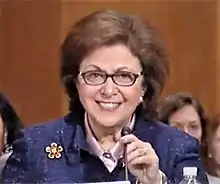Sally Shaywitz
Sally Shaywitz (born 1942) is an American physician-scientist who is the Audrey G. Ratner Professor in Learning Development at Yale University. She is the founder and director of the Yale Center for Dyslexia and Creativity. Her research provides the framework for modern understanding of dyslexia.
Sally E. Shaywitz | |
|---|---|
 Shaywitz in 2016 | |
| Born | 1942 (age 78–79) |
| Alma mater | City University of New York Albert Einstein College of Medicine |
| Scientific career | |
| Institutions | Yale University |
Early life and education
Shaywitz was born and raised in The Bronx.[1] She is the daughter of two Eastern European immigrants.[1] Her father was a dressmaker and her mother a homemaker.[1] She earned her undergraduate degree at City University of New York, and originally considered a career in law.[2] She was accepted early to the Albert Einstein College of Medicine.[2] That year her mother was diagnosed with endometrial cancer, and died just before Shaywitz started her medical studies.[1] When Shaywitz joined medical school, she was one of four women in a class of one hundred students.[1] Shaywitz completed her residency in paediatrics and developmental paediatrics.[1] Alongside completing her training, Shaywitz had three children, whom she raised in Dayton, Ohio.[1]
Research and career
Shaywitz started her medical career seeing patients out of her home in suburban Connecticut.[1] She was eventually recruited by Yale University to look after patients with learning disorders, including dyslexia.[1] In 1979, Shaywitz joined the faculty at Yale.[3] Her research involves longitudinal epidemiological and neurobiological studies. In 1983 she started tracking a cohort of people from kindergarten to adulthood, a study which became known as The Connecticut Longitudinal Study.[4] She showed that boys and girls were equally as likely to be affected by dyslexia.[5] These studies allowed Shaywitz to identify a neural signature of dyslexia, as well as demonstrating that dyslexia is not simply a reading disorder young people 'outgrow'.[4] According to Shaywitz, dyslexia arises due to inefficient function in the neural systems responsible for skilled reading.[5] Shaywitz developed the "Sea of Strengths" model, which explains that dyslexia is a deficit in language processing.[1] Her research identified that there is no connection between dyslexia and intelligence.[5]
In 2003 Shaywitz published Overcoming Dyslexia, a book which helps people identify, understand and overcome challenges in reading.[6]
Awards and honors
- 1995 Albert Einstein College of Medicine Distinguished Alumnus Award[7]
- 1998 Elected member of the National Academy of Medicine
- 1998 Society for Women's Health Research Achievement Award in Women's Health[2]
- 1999 American Academy of Child and Adolescent Psychiatry Sidney Berman Award[8]
- 2003 Margot Marek Book Award[9]
- 2004 City College of New York Townsend Harris Medal[10]
- 2005 Williams College Honorary Doctor of Science degree[11]
- 2012 Samuel Torrey Orton Award (jointly with Bennett Shaywitz)[12]
- 2017 Liberty Science Center Genius Award[13]
- 2020 Elected Fellow of the American Association for the Advancement of Science[14]
Selected publications
- Lyon, G. Reid; Shaywitz, Sally E.; Shaywitz, Bennett A. (2003-01-01). "A definition of dyslexia". Annals of Dyslexia. 53 (1): 1–14. doi:10.1007/s11881-003-0001-9. ISSN 1934-7243. S2CID 145448439.
- Shaywitz, Sally E.; Shaywitz, Bennett A.; Fletcher, Jack M.; Escobar, Michael D. (1990-08-22). "Prevalence of Reading Disability in Boys and Girls: Results of the Connecticut Longitudinal Study". JAMA. 264 (8): 998–1002. doi:10.1001/jama.1990.03450080084036. ISSN 0098-7484. PMID 2376893.
- Shaywitz, Sally E.; Shaywitz, Bennett A.; Pugh, Kenneth R.; Fulbright, Robert K.; Constable, R. Todd; Mencl, W. Einar; Shankweiler, Donald P.; Liberman, Alvin M.; Skudlarski, Pawel; Fletcher, Jack M.; Katz, Leonard (1998-03-03). "Functional disruption in the organization of the brain for reading in dyslexia". Proceedings of the National Academy of Sciences. 95 (5): 2636–2641. Bibcode:1998PNAS...95.2636S. doi:10.1073/pnas.95.5.2636. ISSN 0027-8424. PMC 19444. PMID 9482939.
Personal life
Shaywitz is married to Bennett Shaywitz, a paediatrician with whom she co-founded the Yale Center for Dyslexia and Creativity.[2] They met and were married in 1963.[5]
References
- "Latest from Tech Tonics: Dr. Sally Shaywitz: Advancing Science, Driving Policy, Overcoming Dyslexia". venturevalkyrie.com. Retrieved 2020-12-27.
- "0604bri1". www.regents.nysed.gov. Retrieved 2020-12-27.
- Sally E. Shaywitz. OCLC 4779763538.
- "Sally E. Shaywitz, MD". www.pearsonassessments.com. Retrieved 2020-12-27.
- Hafner, Katie (2018-09-21). "The Couple Who Helped Decode Dyslexia (Published 2018)". The New York Times. ISSN 0362-4331. Retrieved 2020-12-27.
- "Overcoming Dyslexia". Yale Dyslexia. Retrieved 2020-12-27.
- "Alumni Awards | Alumni | Albert Einstein College of Medicine". www.einstein.yu.edu. Retrieved 2020-12-27.
- "Marine Biological Laboratory". comm.archive.mbl.edu. Retrieved 2020-12-27.
- Shaywitz, Sally E. (2003). Overcoming Dyslexia: A New and Complete Science-based Program for Reading Problems at Any Level. A.A. Knopf. ISBN 978-0-679-78159-2.
- "The Townsend Harris Medalists". www.ccnyalumni.org. Retrieved 2020-12-27.
- "Seven to Receive Honorary Degrees". Office of Communications. Retrieved 2020-12-27.
- "Award Recipients". International Dyslexia Association. Retrieved 2021-01-05.
- Center, Liberty Science. "Liberty Science Center Genius Gala To Honor Chris Messina, Hashtag Inventor; Martine Rothblatt, Biotech And Satellite Radio Pioneer; And Drs. Sally And Bennett Shaywitz, The World's Leading Experts On Dyslexia". www.prnewswire.com. Retrieved 2020-12-27.
- "AAAS Announces Leading Scientists Elected as 2020 Fellows | American Association for the Advancement of Science". www.aaas.org. Retrieved 2020-12-27.
